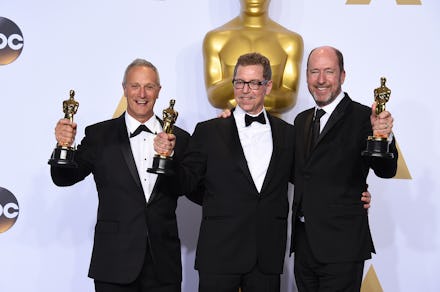Oscars 2017: What is the difference between sound mixing and sound editing?

The nominations for the 89th Academy Awards have been announced, meaning we can start speculating on who will win the big ones. While the focus may be on the major awards (best picture, best director, best actress, etc.), the Oscars recognize how involved the filmmaking process is and include several important below-the-line categories.
Two such categories are for sound editing and sound mixing. Any confusion between the two is understandable, as not only do the categories sound similar, but the films nominated often overlap.
This year, the films nominated for best sound editing are: Arrival, Deepwater Horizon, Hacksaw Ridge, La La Land and Sully. The nominations for best sound mixing, on the other hand, are: Arrival, Hacksaw Ridge, La La Land, Rogue One: A Star Wars Story and 13 Hours: The Secret Soldiers of Benghazi. As you can see, there are a few similarities.
So, what is the difference between the two categories?
Sound editing
Before the Academy changed the category name to sound editing, the Oscars gave out the same award for sound effects editing. The category's former name better describes what the sound editing award recognizes. The rules for the 89th Academy Awards outline the responsibilities of the sound editing supervisors, who ultimately take home the Oscar:
The supervisor(s) must be the primary creative decision-maker and principal interpreter of the director's vision to the sound editing team. The supervisor(s) must approve the sound effects and their specific placement in the film, coordinate the creation of newly designed sound and Foley effects and coordinate the editing of dialogue and ADR. The supervisor(s) must oversee the recording of the pre-dubs and be present at the final mix. In the event the above responsibilities are divided, both co-supervisors must adhere to the above criteria.
Basically, the sound editor is responsible for all of a film's sound elements, including dialogue, sound effects, automated dialogue replacement and more. It is not until all of these elements are brought together that the sound mixer can get to work.
Sound mixing
Once all the different sounds are edited together, the sound mixer comes into play. According to Variety, the sound mixer ultimately determines how an audience hears everything in a film. The sound mixer must decide what elements to emphasize and which to tone down. For example, there may be points in a film where the sound mixer feels the score should reign supreme. At other points, the sound mixer may emphasize the heavy breathing of a protagonist, perhaps during times of extreme stress.
In 2013, Erik Aadahl, who was nominated for sound editing for Argo (along with Ethan Van der Ryn), told Deadline: "One way of thinking about it is kind of like an orchestra, where you'll have the composer composing the symphony and then a conductor saying, 'More flutes here,' and that's very much what mixing is— it's like conducting."
"We're more the composers on the editing side," Aadahl explained. "The mixers are the conductors, and they find those perfect balances to tell the story — between music and sound design and our dialogue — and weave all those together as a conductor would with an orchestra."
So, there you have it! The 89th Academy Awards will air live on Sunday, Feb. 26 at 8:30 p.m. Eastern on ABC.
Mic has ongoing coverage of the Academy Awards. Please follow our main Academy Awards hub here.